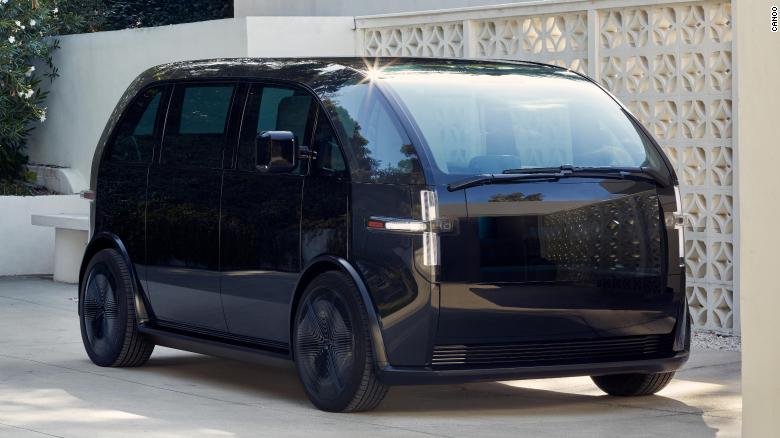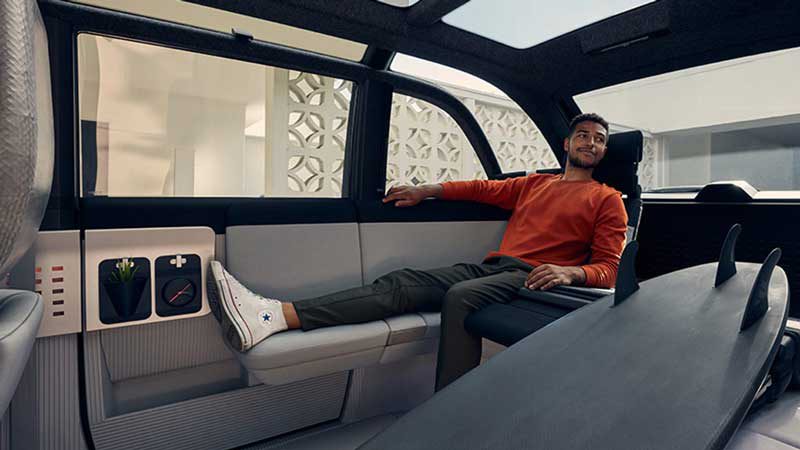A funky-looking and all-electric “mobile living room on wheels” could be the next big trend in mobility – but you won’t be able to buy it.
Unveiled this week by Californian-based EV startup Canoo, the futuristic electric vehicle will only be available on a subscription model.
With oodles of room inside, the Canoo EV takes advantage of the fact that there is no need to factor in a bulky internal combustion engine (ICE) or complex drivetrain.
The simplicity of electric drivetrains lend themselves instead to a “skateboard” style platform (and is other version of which are being implemented by other automakers) on which Canoo has placed its loungeroom-like cabin.
Along with fully electronic steering, it makes for a very simplistic design.

“We implemented the Bauhaus philosophy, which is centered around minimalism and functionality, and started with the reduction to the absolute minimal need,” lead designer for Canoo Richard Kim said in a statement.
The result is a curved pod on wheels looks better suited to cruising from the backyard to the beach rather than fanging around on highways.
Shorter than a Prius but with much more space inside, acting chief executive for Canoo Ulrich Kranz calls it “post-SUV”.
“We call it the post-SUV because it offers a commanding seating position, like in an SUV, and pretty much the same space as a large SUV but on a way smaller footprint,” he said in a statement.
In addition to its funky exterior design, the Canoo EV also offers quirky design features such as a box-shaped steering wheel, which is able to handle tight corners using gentler gestures than the average mechanical steering wheel of ICE vehicles thanks to the steer-by-wire design.

Passengers can access infotainment and comfort features in the car such as temperature controls through a smartphone app.
This shift of focus away from in-vehicle controls towards software-based functions also means that, like Tesla, Canoo can upgrade the vehicle via software updates.
But back to the business model. Canoo is not the first vehicle maker to bandy around the idea of a subscription basis.
Unlike a lease, that still requires drivers to pay for things separately like fuel (or rather in the case of an EV, power), a subscription model would include all costs associated with the vehicle such as energy and connectivity costs.
It’s an idea that is also being put forward by Volvo spinoff Polestar for its Polestar electric SUV, which it intends offering in Australia under a subscription model as well as the option to buy it outright.
However unlike Polestar which will still open showrooms, Canoo says it will only offer its vehicle via a website and app.
By offering solely under a subscription model, Canoo may avoid dramas with auto dealers such as that experienced by fellow EV maker Tesla in certain US states.
Canoo says it intends inking a deal with an auto manufacturer to make its electric vehicles and wants to start production in 2021.

Bridie Schmidt is associate editor for The Driven, sister site of Renew Economy. She has been writing about electric vehicles since 2018, and has a keen interest in the role that zero-emissions transport has to play in sustainability. She has participated in podcasts such as Download This Show with Marc Fennell and Shirtloads of Science with Karl Kruszelnicki and is co-organiser of the Northern Rivers Electric Vehicle Forum. Bridie also owns a Tesla Model Y and has it available for hire on evee.com.au.

